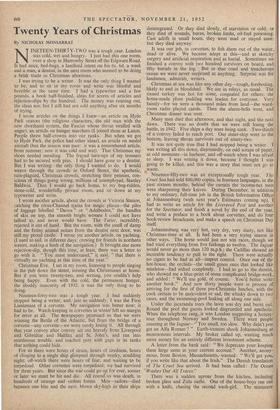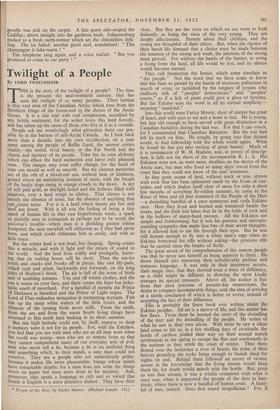Twenty Years of Christmas
By NICHOLAS MONSARRAT
INETEEN-THIRTY-TWO was a tough year. London was cold, wet and hungry. I just had this one room, over a shop in Harrowby Street off the Edgware Road. It had mice, bed-bugs, a landlord intent on his 6s. 6d. a week and a man, a dentist, in the next room who seemed to be.doing a brisk trade in Christmas abortions.
I was trying to be a writer. It was the only thing I wanted to be, and to sit in my room and write was blissful and horrible at the same time. I had a typewriter and a few pounds, a book half-finished, ideas for scores of articles and rejection-slips by the hundred. The money was running out, the ideas not; but I still had not sold anything after six months of trying.
I wrote articles on the things I knew—an article on Hyde Park orators (the religious characters, the old man with the new shorthand system, the Fascist whose throat swelled with anger), an article on hunger marchers (I joined them at Luton. People threw half-crowns into our ranks. But when we got to Hyde Park, the police had other ideas), an article on model aircraft (but the season was past: it was a remembered article, from summer; now it was cold and wet). That Christmas my shoes needed mending. The frayed turn-ups of my trousers had to be secured with pins. I should have gone to a dentist. But I was writing—the only thing I wanted to do. I would weave through the crowds in Oxford Street, the apathetic, rain-plagued, Christmas crowds, stretching'their pennies, con- scious of things going wrong, millions of unemployed, Stanley Baldwin. Then I would go back home, to my bug-ridden, stone-cold, wonderfully private room, and sit down at my typewriter and write.
I wrote another article, about the crowds at Victoria Station, catching the cross-Channel trains for magic places—the piles of luggage labelled " Davos " or " Adelboden," the bundles of skis on top, the smooth bright women I could not have talked to, and never would have. The Taller, incredibly, rejected it out of hand. But the room, with the smell of damp and the funny animal noises from the dentist next door, was still my proud castle. I wrote yet another article, on yachting. (I used to sail, in different days; crewing for friends in northern waters, making a hash of the navigation.) It brought one more rejection-slip, though this time; at least, there was a letter to go with it. " You must understand," it said, " that there is virtually no yachting at this time of the year."
Christmas Eve. I sat in my room, listening to people singing in the pub down the street, missing the Christmases at home. But if you 'were twenty-two, and writing, you couldn't help being happy. Even with the cold, 'the permanent hunger, the shoddy insecurity of 1932, it was the only thing to be doing.
Nineteen-forty-two was a tough year. I had suddenly stopped being a writer, and, just as suddenly, I was the First Lieutenant of a corvette. My navigation was better now; -it had to be. Watch-keeping in corvettes in winter left no margin for error at all. The newspapers promised us that we were winning the Battle of the Atlantic, but from the bridge of a corvette—any corvette—we were surely losing it. All through that year convoy after 'convoy set out bravely from Liverpool and Gibraltar and Halifax and St. John's, and ran into murderous trouble, and reached port with gaps in its ranks that nothing could hide.
For us there were hours of strain, hours of tiredness, hours of clinging to a single ship glimpsed through murky, scudding night; off-watch there were hours of fear, and waiting to be torpedoed. Other corvettes were torpedoed; we had survived for three years. But since the war could go on for ever, sooner or later we must be hit and die. All round' us was death, in hundreds of strange and violent forms. Men —sailors--died between one bite and the next, blown sky-high as their ships disintegrated. Or they died slowly, of starvation or cold; or they died of wounds, burns, broken limbs, oil-fuel poisoning. Cast adrift in small boats, they went 'mad or stayed sane; but they died anyway.
It was .our job, in corvettes, to fish Ahem out of the water, dead or alive. We became adept at this—and at sketchy surgery and artificial respiration and at burial. Sometimes we finished a convoy with two hundred survivors on board, and fifty burials in the log. But. in that cruel and •treacherous ocean we were never surprised at anything. 'Surprise was for landsmen, admirals, writers.
Christmas at sea was like any other day—rough, foreboding, likely to end in bloodshed. We ate in relays, as usual. The tinned turkey was hot for some, congealed for others; the home-made plum pudding was leaden for everyone. Very faintly—for we were a thousand miles from land—the ward- room radio played carols. Then the alarm-bells went, and Christmas dinner was over.
Many men died that afternoon, and that night, and the next dawn. There was no doubt that we were still losing the battle, in 1942. Five ships a day were being sunk. Two-thirds of a convoy failed to reach port. Our sister-ship went to the bottom, leaving eleven survivors out of. ninety-two.
It was not quite true that I had stopped being a writer. was writing all this down, disjointedly, on odd scraps of paper, at odd moments—in harbour, and off-watch when I was afraid to sleep. I was writing it down, because I thought I was going to be killed, and this was a story that must not go to waste. '
Nineteen-fifty-two was an exceptionally tough year.' The Cruel Sea\had sold 800,000 copies, in fourteen languages, in the past sixteen months; behind the curtain the income-tax men were sharpening their knives. During December, in addition to my ordinary, full-time job in the British Information Office at Johannesburg (with next year's Estimates coming up), 1 had to write an article for the Liverpool Post and another for the Spectator, and finish a novel by the end of the year. and write a preface to a book about corvettes, and do four book-review broadcasts, and make a speech on Christmas Day itself.
Johannesburg was very hot, very dry, very dusty, not like Christmas-time at all. It had been a very trying season in other ways. The horse would just not win races, though we had tried everything from five furlongs to twelve. The Jaguar would never go more than 120 m.p.h.; the Cadillac showed an incurable tendency to pull to the right. There were actually no cigars to be had at all—import control. Once out of the hot-house, the orchids—the small green ones that looked like mistletoe—had wilted completely. I had to go to the dentist, who showed me a blue-print of some complicated bridge-work, and added : " We'll use gold, of course. You'd better write another book." And now thirty people were in process of arriving for the first of three pre-Christmas lunches, with, the cook certain to be malevolent or sad, the whisky down to two cases, and the swimming-pool leaking all along one side.
Under the jacaranda trees the lawn was dry and burnt out. Round the pool the guests looked disgruntled and apathetic. When the telephone rang, it was London suggesting a lecture- tour throughout Norway and Sweden. There were people sneering at the Jaguar—" Too small, too slow. Why didn't you get an Alfa Romeo ? ". Earth-tremors shook Johannesburg at monotonous intervals. My broker called up, wanting much more money for an entirely different investment scheme.
A letter from the bank said : " We deprecate your keeping these large sums in your current account." Another, anony- mous, from Boston, Massachusetts,- warned : " We'll get you, if you write like that about the Irish." The Danish translation of The Cruel Sea arrived. It had been called: The Ocean Washes Out All Traces."
There was a sudden uproar from the kitchen, including broken glass and Zulu oaths. One of the house-boys ran out with a knife, chasing the second wash-girl. The miniature poodle was sick on the carpet. A late guest side-swiped the Cadillac; drove straight into the gardenia bush. Johannesburg rocked to a fresh earth-tremor which set the chandeliers tink- ling. The ice failed; another guest said, scandalised : " This champagne is luke-warm I " The telephone rang again, and a voice waived : " But you promised to come to our party ! "











































































 Previous page
Previous page